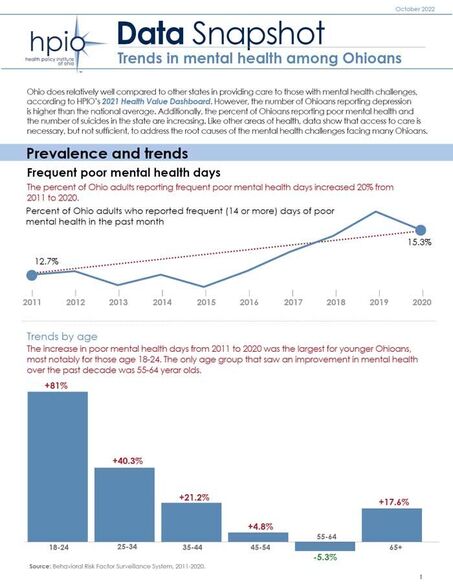Data Snapshot:
Trends in Mental Health among Ohioans
Overview
Ohio does relatively well compared to other states in providing care to those with mental health challenges, according to HPIO’s 2021 Health Value Dashboard.
However, the number of Ohioans reporting depression is higher than the national average. Additionally, the percent of Ohioans reporting poor mental health and the number of suicides in the state are increasing. Like other areas of health, data show that access to care is necessary, but not sufficient, to address the root causes of the mental health challenges facing many Ohioans.
This HPIO data snapshot includes visualizations on mental health prevalence and trends in Ohio (frequent poor mental health days and depression), access to mental health care and quality and trends in suicide in Ohio. It also includes a list of resources to improve mental health in Ohio.
UPDATE (1.13.2023): A graphic on page 3 of the original version of this publication, under the heading “Receiving treatment,” used data from the 2019-2020 National Survey on Drug Use and Health (NSDUH). Since publication, the Substance Abuse and Mental Health Services Administration, the federal agency that oversees NSDUH, has determined that it will no longer make state estimates available for 2019-2020 due to methodological concerns with combining 2019 and 2020 data. Data for the affected graphic was replaced with 2018-2019 data. For more information, please see: https://www.samhsa.gov/data/report/2019-2020-nsduh-state-specific-tables
By:
Nick Wiselogel, MA
Amy Bush Stevens, MSW, MPH
Lexi Chirakos, PhD
Published On
October 20, 2022
Table of Contents
 Download Publication
Download Publication
